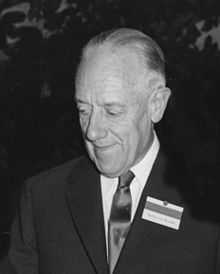Detlev Bronk
| Detlev Bronk | |
|---|---|
 Bronk in 1963 | |
| Born |
Detlev Wulf Bronk August 13, 1897[1] New York City[1] |
| Died |
November 17, 1975 (aged 78)[1] New York City[1] |
| Fields | Scientist |
| Institutions |
Johns Hopkins University[2] National Academy of Sciences[3] National Science Board[4] University of Pennsylvania[5] Rockefeller University[1] World Academy of Art and Science[6] |
| Alma mater |
Swarthmore College[1] University of Michigan[1] |
| Notable awards |
Franklin Medal (1961)[7] Presidential Medal of Freedom (1964)[1] Public Welfare Medal (1964) National Medal of Science (1968)[8] Fellow of the Royal Society[9] |
Detlev Wulf Bronk (August 13, 1897 – November 17, 1975) was a prominent American scientist, educator, and administrator. He is credited with establishing biophysics as a recognized discipline. Bronk served as President of Johns Hopkins University from 1949 to 1953 and as President of The Rockefeller University from 1953 to 1968. Bronk also held the presidency of the National Academy of Sciences between 1950 and 1962.[9][10][11][12][13][14][15]
Bronk was a descendent of Jonas Bronck, an early settler to New Netherland from whose name the The Bronx is derived.[16] Bronk graduated from Swarthmore with a B.S. in electrical engineering. In September 1921 Bronk married Helen Alexander Ramsey, who had been a fellow student at Swarthmore. Turning to physics, he received an M.S. in 1922 from the University of Michigan. By 1924 he was intent on applying physics and mathematics to physiology, receiving a Ph.D. in 1926 from the University of Michigan.
Career
From 1953–1968 Bronk was president of The Rockefeller University. (The Rockefeller Institute for Medical Research was renamed The Rockefeller University in 1965). He firmly espoused academic freedom and resisted attempts by Wisconsin Senator Joseph McCarthy to have Johns Hopkins University dismiss Professor Owen Lattimore. The same year he was awarded the Public Welfare Medal from the National Academy of Sciences.[17] He was credited with formulating the modern theory of the science of biophysics.[18] Bronk was awarded the Presidential Medal of Freedom by President Lyndon B. Johnson on September 14, 1964. He was also a member of the National Aeronautics and Space council. He was a member of the Scientific Advisory Committee of the Brookhaven National Laboratories and a founder and President of the World Academy of Art and Science (WAAS). He was also an advisory member of the Atomic Energy Commission. He served on the board of trustees for Science Service, now known as Society for Science & the Public, from 1965–1967. Bronk is quoted as saying:
"A great deal of undergraduate education is built on ... telling a student what to do—at the very time he is developing intellectual habits for life. Too rarely is a student told, 'This is the problem with which we are going to deal. Here are the books.' "
References
- ↑ 1.0 1.1 1.2 1.3 1.4 1.5 1.6 1.7 Ohles, Ohles & Ramsay: Biographical Dictionary of Modern American Educators, p.42: Greenwood Press, 1997. ISBN 0-313-29133-0
- ↑ The Johns Hopkins University – Past Presidents at the Wayback Machine (archived February 12, 2008). Johns Hopkins University
- ↑ National Academy of Sciences: About the NAS: President at the Wayback Machine (archived June 13, 2011)
- ↑ Educational Foundation for Nuclear Science, Inc. (February 1976). Bulletin of the Atomic Scientists. Educational Foundation for Nuclear Science, Inc. pp. 6–. ISSN 0096-3402. Retrieved February 15, 2012.
- ↑ History of the Penn Comprehensive Neuroscience Center. Uphs.upenn.edu. Retrieved on February 15, 2012.
- ↑ History|World Academy of Art & Science. Worldacademy.org (December 24, 1960). Retrieved on February 15, 2012.
- ↑ The Franklin Institute Awards. Fi.edu. Retrieved on 2012-02-15.
- ↑ U.S. National Science Foundation – The President's National Medal of Science: Recipient Details. Nsf.gov. Retrieved on February 15, 2012.
- ↑ 9.0 9.1 Adrian, L. (1976). "Detlev Wulf Bronk 13 August 1897 -- 17 November 1975". Biographical Memoirs of Fellows of the Royal Society 22: 1–9. doi:10.1098/rsbm.1976.0001. PMID 11615711.
- ↑ Lee, M. O. (1951). "Detlev W. Bronk, Scientist". Science 113 (2928): 143. doi:10.1126/science.113.2928.143.
- ↑ Greenberg, D. S. (1967). "The National Academy of Sciences: Profile of an Institution (II)". Science 156 (3773): 360–364. doi:10.1126/science.156.3773.360. PMID 4886535.
- ↑ De Duve, C. (1976). "Notes on the life and work of Detlev Wulf Bronk, honorary foreign member". Bulletin et memoires de l'Academie royale de medecine de Belgique 131 (3–4–5): 176–183. PMID 798623.
- ↑ Brink, Jr (1975). "Detlev Wulf Bronk" (PDF). Memoirs of the National Academy of Science 50: 3–40.
- ↑ Detlev W. Bronk Records, 1954–1968.
- ↑ National Academy of Sciences Biographical Memoir
- ↑ http://news.google.com/newspapers?nid=888&dat=19751119&id=9tNQAAAAIBAJ&sjid=Tl8DAAAAIBAJ&pg=5684,3204966
- ↑ "Public Welfare Award". National Academy of Sciences. Archived from the original on June 4, 2011. Retrieved February 18, 2011.
- ↑ The Twentieth Century. 11 Alfred Newton Richards: Biomedical Research. repository.upenn.edu
| ||||||
| ||||||
|